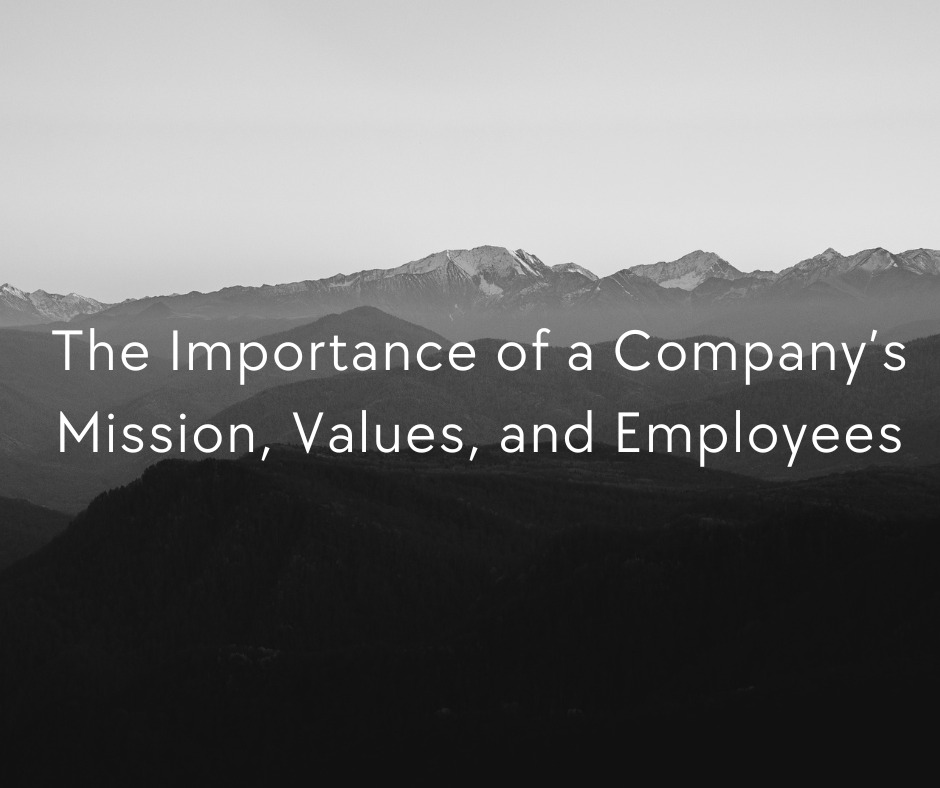A company’s mission, values, and employees are essential components that contribute to its success. These elements are interconnected and are critical in shaping the company’s culture, guiding its decisions, and driving its performance. In this article, we will discuss the importance of a company’s mission, values, and employees in detail, and how they work together to create a successful organization.
As mentioned in the Harvard Business Review article “
Crucibles of Leadership“, it is harsh times that allow for growth, and that is when great leaders to emerge. Research aims to identify the traits that allow leaders and organizations to thrive in disruption. In the upcoming book “The Tranformation Myth”, the author finds common qualities among those organizations such as being constantly “sensing, testing and adapting” in order to keep progressing in an ever-evolving business environment. Following, a subset of 50 interviews conducted with tens of executives in the period spanning from March to October 2020 examining their “deep self-reflection”. It has been observed how the concepts of purpose, values and mission have been consistent parts of their thought processes.
Purposes
In “Start With Why: How Great Leaders Inspire Everyone to Take Action”, Simon Sinek underlines a mistake many leaders make; starting by asking themselves what they wish to accomplish, instead of why their organization exists. Mr. Sinek proceeds then to explain how, backed by statistics, companies who define themselves as being driven by clear purposes can create better connections with customers, employees and society to the point where they experience clear economic gains.
Having in mind a clear purpose for one’s organization has been gaining an increasing societal importance, to the point where hundreds of CEOs signed the “Statement on the Purpose of an Organization”, recognizing the importance of needing a purpose beyond products and services.
A positive example of what has been explained so far has been provided by the team of physicians at Envision Healthcare, who knew they had to “do everything they could to slow the spread of COVID-19”. Eric Schuetzler, again driven by a purpose-driven approach, helped shift the Beam Suntory factory lines to the production of hand sanitizer for hospitals.
Identifying a purpose helps companies and individuals to focus on what’s important. Purpose-oriented environments helps employees persist through challenges and go the extra mile. It also helps to build customer trust in brands.
Values
The lack of clearly defined values may lead to rushed or questionable decisions in times of uncertainty. Such is the case of Uber, that when faced with hypergrowth, had to quickly promote many employees with no clear directives coming from the organization’s leadership creating a toxic culture to develop within parts of the company.
In another example, Uber CEO Dara Khosrowshahi spent months documenting what worked for the company and what didn’t. During the process, he worked to develop a set of values together with Uber’s employees, not believing in values written “in a closed room” pushed from the top down.
Lastly, true and strong values hold even in times of crisis. When asked about their concerns in the wake of COVID-19 pandemic, Brian Baker, the Global People Strategy Business Partner at the WPP Conglomerate talked about his fear of losing out on the efforts put towards cultivating diversity within the company. The company managed however to stay focused on DEI (diversity, equity, inclusion) and pushed through.
A company’s values are the principles and beliefs that guide its behavior and decision-making. They reflect the organization’s culture and define what it stands for. Some of the key reasons why a company’s values are important include:
- Shapes Company Culture: A company’s values are a key component of its culture, shaping the behavior and attitudes of employees. They provide a framework for decision-making and ensure that all actions align with the organization’s core principles.
- Builds Trust and Loyalty: Values can build trust and loyalty among stakeholders, including customers, employees, and investors. They demonstrate the organization’s commitment to ethical behavior, transparency, and accountability, and can enhance its reputation and credibility.
- Attracts and Retains Employees: A company’s values can attract and retain employees who share its beliefs and principles. They can help create a strong sense of community, foster employee engagement, and improve retention rates.
Mission
“Mission” describes what the organization wishes to accomplish. While this seems of higher immediate importance, it comes last as it’s only by knowing the why and how that one may clearly find their goals.
Many executives interviewed reported employees using the organization’s mission to better understand how to do their best work. David Quigley, Provost and Dean of Faculties at Boston College, said the role of the mission was of great importance in deciding to return to in-person learning during the fall of 2020.
The military term “commander’s intent” represents the description and definition of what a successful mission will look like. It’s of vital importance in guiding an organization through the fog of disruption faced during the harrowing times brought upon by the pandemic. Resilient organizations operate like military units in that they provide their employees with the freedom, within boundaries, to make decisions. With clearly defined missions, teams can understand their objectives and creatively adapt to crisis.
Michael Aldridge, Associate Vice President of Experience at health insurer Humana, explained the role of commander’s intent in adapting to the new circumstances being faced. Humana tackled customers’ food insecurity issues instituting a new program, “Basic Needs”. By putting huge effort the small Humanita team was able to increase their impact on a large scale.
Honesty plays a big part in making such communications effective. An example of this was provided by Emma Lewis who, as the General Manager of Shell Polymers and Global Chemicals Strategy at Shell, spoke to her employees about her feelings on the outbreak of racial justice protests in the summer of 2020.
A company’s mission is its purpose, which defines why it exists and what it aims to achieve. It is a statement that communicates the organization’s fundamental reason for being, and what it intends to accomplish in the long-term. Some of the key reasons why a company’s mission is essential include:
- Provides Direction and Focus: A mission statement outlines the company’s objectives, goals, and priorities, and provides employees with a clear sense of direction. It guides the organization’s decision-making process and helps ensure that all actions align with the company’s overall purpose.
- Builds Credibility and Reputation: A well-defined mission statement can help build the company’s credibility and reputation in the eyes of its stakeholders, including customers, investors, and employees. It communicates the organization’s values, principles, and goals, and demonstrates its commitment to its customers and the wider community.
- Inspires and Motivates Employees: A mission statement can inspire and motivate employees by providing them with a sense of purpose and meaning. It can help create a shared sense of identity, foster a strong company culture, and improve employee engagement and retention.
The Journey Forward
A company’s mission, values, and employees are interconnected and essential components that contribute to its success. A clear and well-defined mission statement provides direction and focus, builds credibility and reputation, and inspires and motivates employees. Values shape company culture, build trust and loyalty, and attract and retain employees who share the organization’s beliefs and principles.
Finding or forming a set of purposes, values or missions in one’s work environment may not always be easy. However, taking the first step can lead to great long term results. Leaders and employees should use this crisis for personal growth and revisiting of these key points.








